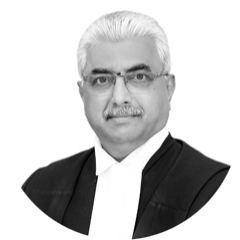Aravind Kumar

Aravind Kumar
Sitting Judge of the Supreme Court of India
Assumed Office13th Feb, 2023
Retires On13th Jul, 2027
Previously
Chief Justice Gujarat High CourtOctober 13th 2021 – February 12th 2023
Judge of the Karnataka High CourtJune 26th, 2009 – October 12th, 2021
Profile
Early Life and Education
Justice Aravind Kumar was born on 14 July 1962 in Karnataka. He completed his schooling and college in Bangalore. He completed his graduation at National College, Bangalore. Subsequently, he obtained a law degree from Bengaluru University. He was an active Student Union Leader and Vice President of Bangalore University Student’s Action Committee.
Career as an Advocate
After completing his law degree he enrolled as an Advocate in 1987, and started arguing before Trial Courts for three years. He also appeared beforeCivil Courts, Magistrate Courts, and Appellate Tribunals. In 1990, Justice Kumar shifted his practice at the Karnataka High Court.
In 1999, he was appointed as Additional Standing Counsel for the Union government at the Karnataka High Court. In 2002,he was appointed as a Member of the Regional Direct Taxes Advisory Committee.In 2005, he was appointed as an Assistant Solicitor General of India, and argued cases covering the Constitution of India, Central Excise Act, Customs Act, Code of Civil Procedure,Criminal Procedure Code, etc. He also took up a number of Election Petitions and was the Standing Counsel of the Income Tax Department for 11 years.
He has also held the position of Special Public Prosecutor for the Central Bureau of Investigation. He was the Vice-President and a Founding Member of the Lahari Advocates Forum, an organisation which promoted legal education and trained young advocates by conducting workshops and orientation courses.
Career as a Judge
After over 20 years as an advocate, Justice Kumar was appointed as an Additional Judge of the Karnataka High Court on 26 June 2009. He was then made a Permanent Judge of the High Court on 7 December 2012. At the Karnataka High Court, Justice Kumar was the Executive Chairman of the Karnataka State Legal Services Authority. He was also part of the Bench that oversaw the implementation of COVID-19 protocols in the state along with Justice A.S. Oka (then Chief Justice of Karnataka High Court).
On 13 October 2021, he was appointed as the 27th Chief Justice of the Gujarat High Court. At that time, he took up measures to reduce pendency of old cases at the Gujarat High Court and the District Courts of Gujarat. In his farewell address at the Gujarat High Court, Justice Kumar stated that 175 cases which were pending for more than 30 years were disposed of in 87 days.
He set up ‘justice clocks’ in each courtroom to track pendency of cases and displayed them on the High Court website. During his tenure, the quarterly rate of clearance of cases remained above 85%.
He also initiated the Signal Schools during his 1.4 years tenure as Gujarat’s Chief Justice to increase legal education. Justice Kumar first established a similar program while when he was at the Karnataka High Court.
On 31 January 2023, the Supreme Court Collegium led by Chief Justice D.Y. Chandrachud recommended Justice Kumar’s elevation to the Supreme Court. He was recommended alongside Justice Rajesh Bindal. At the time of his elevation, he was at SI No. 26 in the All-India-seniority of High Court Judges. His appointment was confirmed on 10 February 2023. He took oath as a Judge of the Supreme Court on 13 February 2023.
He will retire after a four year long tenure in July 2027.
Notable Judgements
In Ch. Joseph v Telangana State Road Transport Corporation (2025), a Division Bench held that it is the duty of the employer to provide reasonable accommodation to employees who acquire a medical condition or disability during their service. The judgement, authored by Justice Kumar, directed the Telangana State Road Transport Corporation to provide alternate employment for the appellant whose employment was terminated after he was diagnosed with colour blindness.
In Kolkata Municipal Corpn. v Bimal Kumar Shah (2024), a Division Bench of Justices P.S. Narasimha and Kumar affirmed that the Kolkata Municipal Corporation Act had no power to compulsorily acquire immovable property. The Bench described the right to property under Article 300A as an intersecting net of seven non-exhaustive sub-rights, which includes the right to be heard.
In Eknath Kishan Kumbharkar v State of Maharashtra (2024), the Court set aside a capital punishment awarded to a man for murdering his daughter, after an inter-caste wedding. The Justice Kumar-authored verdict held that the case did not fall under the “rarest of rare” doctrine after assessing the mitigating circumstances. The convict was directed to undergo a rigorous imprisonment for 20 years.
In Harsh Automobiles (P) Ltd. v Indore Municipal Corporation (2023), a Division Bench held that the signboards of commercial businesses are not advertisements under Section 2(1) of the Madhya Pradesh Municipal Corporation Act, 1956. The judgement, authored by Justice Kumar, held that the primary purpose of such signboards was not to solicit business. The Bench held that the Municipal Corporation was not entitled to levy tax from the businesses.
In Shri B S Yeddyurappa vs Anti-Corruption Bureau (2017), a single-judge bench of Justice Kumar granted an interim stay on the registration of FIRs against former Karnataka Chief Minister B.S. Yedyurappa. He was accused of giving undue favours to private parties in a land acquisition case.